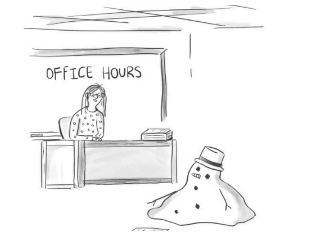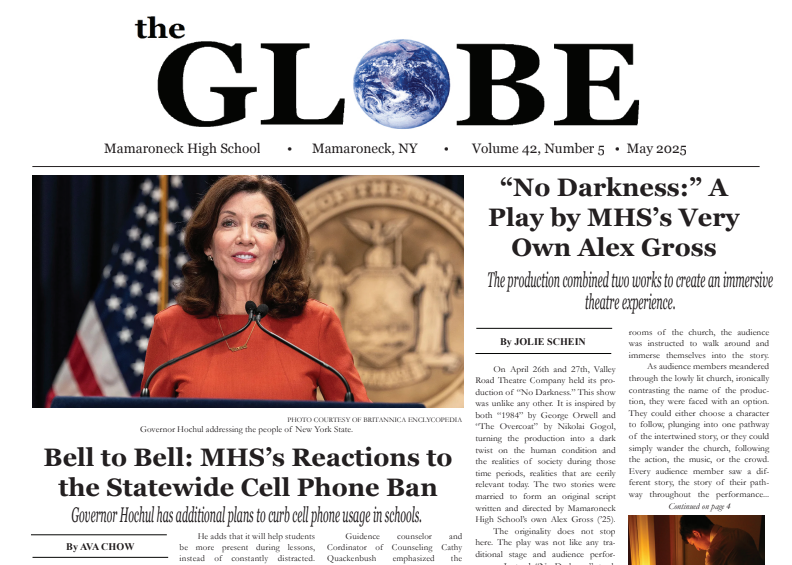Mamaroneck’s Office Hours Struggle
MHS students share their thoughts on the struggle that has become office hours.

Photo Courtesy of Kimberly Wei
Frosty the Snowman/Had to hurry on his way/But he waved goodbye, saying, “Don’t you cry, I’ll be back from Office Hours some day.”
December 15, 2022
Mamaroneck High School (MHS) is a competitive, academic environment. Students are motivated to succeed as much as possible in their classes and are pushed and push themselves to do their best academically. However, no student will ever be able to immediately understand every concept taught to them, nor will any student not miss a single class or school day of their MHS curriculum. Therefore, most students feel the need to use extra time outside of class periods to meet with teachers, whether it is to complete a missed test or quiz, finish a project, or simply receive assistance on a homework assignment. Currently, MHS blocks the 20 minutes after school ends each day as an “office hours” period, which proves useful to some students. But the Globe staff agrees that the present system is nowhere near helpful enough for students to truly get the time with teachers they need and that it is time to rethink the way in which MHS handles office hours.
It would be unfair to call office hours nonexistent in today’s Mamaroneck High School, as many students can and do find time to take care of their needs with teachers. Students tend to email teachers or talk to them after class and arrange a meeting before school, during lunch, during a free period, or after school. Some Globe staff members feel that they have never had a problem getting in touch with a teacher, and often, a time can be easily scheduled.
Unfortunately, a majority of the staff has not found this process fruitful, noting that teachers frequently are very particular about the times outside of a student’s class that they are available. Despite the supposed 20-minute “bonus” period after the conclusion of classes, many Globe staff members have discovered that teachers are unable to meet with students during this time, as they also have a host of other responsibilities that need to be completed following the school day. Students themselves often have activities directly after school or need to leave right at 2:40 for another reason. Some staff members point to students who participate in sports teams as an example of this, as they often need to get ready, meet with their teams, and begin warming up for practice as soon as they are let out of the day’s final class.
Meeting before school is often the easiest option for teachers, who usually arrive well before the first period in order to plan for the day, but it can be difficult for students to arrive at school earlier than 8:00, and there is regularly a struggle to fit in all necessary matters with teachers that need to be covered. A large number of students do not have free periods and those who don’t always have their free periods aligned with those of teachers, making them a non-option for many students. In addition, this short allotment of time is really only helpful for quick questions, and cannot be reasonably used for the longer sessions required for going over a lesson or taking a test.
That leaves before or during the school day as options. Lunch is generally a busy time, as students’ schedules tend to be loaded with clubs and studying. However, Lunch is the only point during the day in which all students and teachers can be at school together, and it is a universal free period, so utilizing lunch productively can be a vital tool for many students and teachers. Some staff members do note that prior to the COVID-19 pandemic, teachers more frequently hosted office hours during lunch, though they have not come back in any meaningful capacity since the return of “normal” school. Staff members also believe that this is in contrast to the situation at Hommocks Middle School, where office hours during lunch are heavily defined and advertised, making it much easier for students and teachers to meet. As a solution, MHS could look into extending the lunch period by a small increment of time, which would make it possible for both students and teachers to fit more into the period.
Globe staff members have also had trouble arranging these meetings, even if a possible meeting time does exist. Most notably, there have been issues using email to set up times, as both parties are frequently busy and not always able to be constantly checking their emails.
Another proposal agreed upon by the Globe staff would be to rework the school’s daily schedule in order to fit a dedicated office hours period. This could entail slightly shortening class periods by a few minutes each in order to create a “bonus” period at some point during (not before or after) the day that would be more useful than the current 20-minute system. Teachers and students alike would be less rushed with completing what needs to be addressed and both parties would always have this period available to meet.
Regardless of what time office hours end up being scheduled for, a new system for arranging office hours meetings could be vital. This way, the rudimentary system of a mix of email and quick discussions with teachers could be done away with. In replacement, some Globe staff members point out that MHS could introduce a new electronic system, such as an app, that would streamline the whole process. Teachers would be able to list all the times that are available to them as well as the amount of time that they are available in that period and students could use the program to sign up for whenever works best for them. This way, both parties would be less stressed about how and when they are going to meet, and teachers would be able to see the demand and better plan for when they will see their students for extra help.
It is evident, looking at Mamaroneck’s current office hours system, that change is in order. Students are unable to find time to meet with teachers at the times they need, and communication between the two is not always the best. While they recognize the difficulty of such changes, the Globe staff believes it is essential that the school begins to think about and introduce new procedures that will help both teachers and students succeed in their classes as much as possible.





